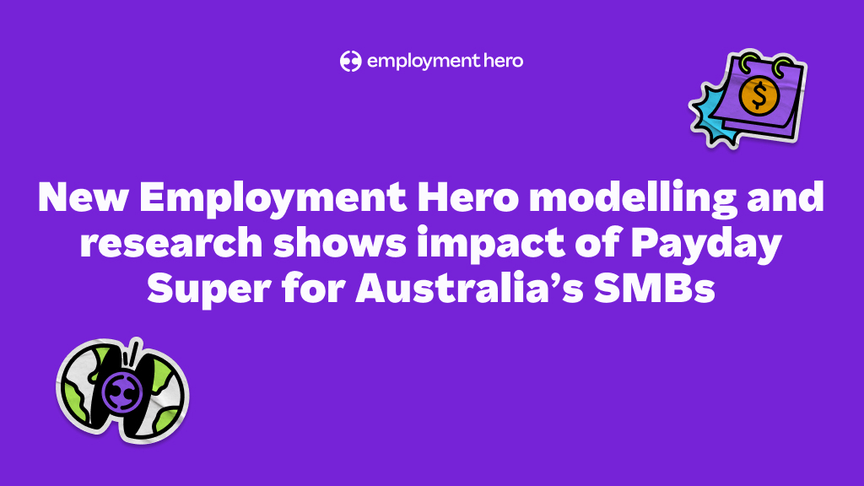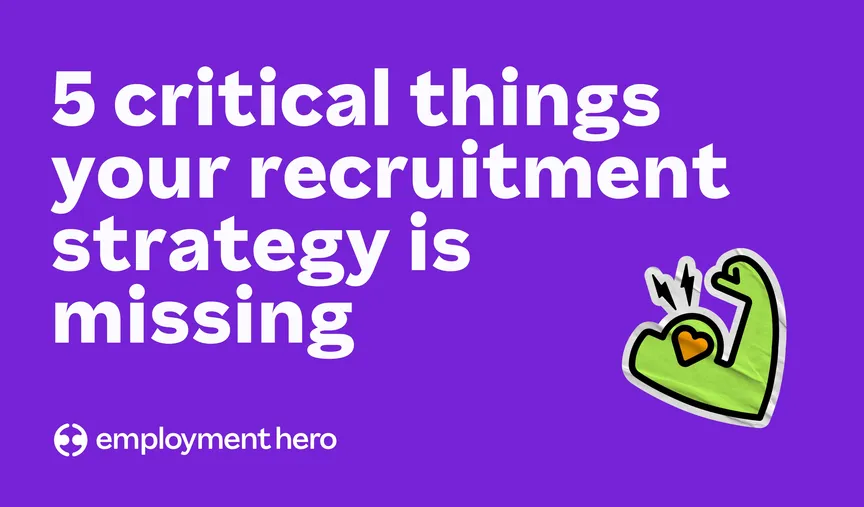What is an employee value proposition (EVP), and why is it important?
This HR buzzword is critical for your business, so we’ve written this to give you the low-down on employee value proposition and what it means for your business.

Contents
We can’t stress this enough, with some SMEs investing over $50 000 a year on hiring, our Recruitment Snapshot Report highlights just how important it is to get your employee value proposition right. A strong EVP can help you attract and keep the right talent, making every dollar count.
An employee value proposition is the balance of rewards and benefits that a company can offer its employees in return for their amazing performance within the workplace. An EVP includes everything an employer is doing to attract and retain employees, which is largely beneficial for the success of a business.
If you’re looking to build an EVP from the ground up, then this guide will help you understand the right way to craft one. The employee value proposition concept as we know it today was formed from the marketing idea known as ‘Unique Value Proposition’; the value the company provides to customers that makes it stand out from competitors.
Employee value proposition examples
An employee value proposition is a unique value that a company can offer its employees. An EVP should also shift focus from compensation to other things, such as employee development paths, internal reward and recognition programs and community initiatives.
- An office bar? Work gym? Generous leave allowances? This is part of your EVP.
- Proud of the work-life balance in your team? That’s also part of your EVP.
- Strong diversity, equity and inclusion culture? Definitely part of your EVP.
- Got any fancy team-building events on the regular? Yes, that’s your EVP too.
Your employee value proposition includes all the incentives, perks, benefits and support systems you offer to make your workplace more attractive, especially when compared to your competitors.
Why is a strong employee value proposition important?
Your EVP is what sets you apart from the competition when you’re hiring. With hiring costs only growing, and top talent in short supply, it’s more important than ever to craft something compelling.
Helps attract talent
It’s crucial you have a strong EVP that will help you attract and retain the best employees possible to help grow your business. Having an effective EVP can help to attract new employees that have goals and values that align with your business.
When done well, a compelling EVP gives candidates a clear picture of the role and company culture, helping them determine whether they’re a strong fit from the outset.
Improves company reputation
A good employee value proposition will also elevate your entire employment brand, making your business a more desirable place to work. Everyone has, at one point or another, heard whispers of a business that may have a shiny facade but conceals a toxic workplace.
Employees (and customers) talk, and you want them to say that at your business everyone has a wonderful experience.
Reduces employee turnover
Job seekers are actively looking for positive employer branding, making it an important aspect of your hiring process to pay attention to. Companies with a strong EVP can reduce annual employee turnover and increase new hires.
If you’re having trouble recruiting talent, maybe it’s time to do things differently. That could very well include overhauling your EVP.
Things to consider when developing an EVP
When developing your EVP, there are a few things to consider. To start, ask current employees why they think working at your company is so great. Send out anonymous employee surveys to gain valuable feedback and figure out what you already do well. Why start from scratch when you might already be doing some amazing things that employees and candidates love?
Could it be because you champion employee career development? Or perhaps you promote a great work-life balance with flexible working arrangements. It might also be worth including questions on this survey that reveal what your business doesn’t do so well and areas where current employees feel you could work on. Here are some of the main things to consider when developing your employee value proposition:
Employee salary expectations
Salary is one of the key factors for any new role, people have bills to pay, mouths to feed and the latest shoes to buy. A common mistake when building out your EVP is inflating salaries because of huge competition.
You can’t compete with a competitor for talent purely on financial rewards, it’s also an easy way to burn through any budget you may have set aside for new hires. By considering other parts of the EVP, salary is no longer the sole focus.
On the other hand, you don’t want to undervalue potential employees. Another common mistake from HR is not monitoring employees’ core skills, development and learning. By losing track, you run the risk of undervaluing your team. This might encourage them to look elsewhere. As a general rule, review employee salaries against industry benchmarks on an annual basis to make sure they are earning what they deserve.
Rewards and recognition
Candidates don’t just look at salary, they also look at reward and recognition, employment benefits and all the perks associated with a job. In other words, top candidates are looking at the entire compensation package rather than just the monetary amount. Rewards and recognition, or employee benefits, come in three forms:
- Supplementary compensation: Free coffee, health insurance, gym memberships, flexible working, caregiver support, company-sponsored holidays, employee share schemes (the list is endless, just budget-dependent).
- Values, mission and purpose: Making them feel like their job really matters, which is a key driver to boosting employee engagement.
- People and culture: Great people want to work with great people, and creating a positive work environment is a surefire way to make people feel excited about coming to work every day.
Company culture
We’ve previously put the spotlight on the importance of company culture within a business. If you offer regular staff events, incentive schemes, rewards or competitions, make sure to highlight these from the outset.
Express these clearly in your EVP, and remember, with platforms like LinkedIn potential hires can reach out to past employees. Don’t just speak your values, live them. Ensuring your company culture is healthy and genuine will make your business more appealing. There is nothing more damaging to your culture’s reputation than promising something that employee reviews do not reflect.
How to evaluate and measure if you have an effective employee value proposition?
To know if your employee value proposition is truly working, you need to back it up with real data. One of the best ways to do this is by running employee engagement surveys on a regular basis. These surveys can help you understand how your team feels about the rewards, benefits, and overall experience your business offers.
Do they feel motivated, valued, and supported? Are they recommending your business to others? Comparing results over time will show whether your EVP is delivering on its promise or if it’s time for a refresh.
Is there a difference between employee value proposition and employer value proposition?
While the terms may seem interchangeable, your employee value proposition and employer value proposition are two sides of the same coin. Employee value proposition refers to the tangible benefits, rewards, and culture offered internally to your employees.
Your employer value proposition is your employer brand, and as mentioned before, refers to how your organisation markets itself externally to potential hires. To stand out, companies must ensure that their EVP is not only authentic but also aligns with their own employee value proposition. A mismatch between the internal and external story can cause confusion, mistrust, and even harm your brand reputation.
What about employer brand?
Your employer value proposition and employer brand both focus on your external reputation, but with subtle differences. The employer value proposition is how you communicate your internal offering to the outside world, while your employer brand is the perception that forms in the minds of potential candidates.
Avoiding the common pitfalls of an EVP
The Australian Government Department of Skills and Employment offers some further insights and tips into the value of an EVP stating that a strong employer brand is crucial in helping you to attract, engage and retain high-quality employees. It lets potential applicants know why they should choose your business and makes a promise about the employee experience. It continues to explain that there are two traps in the EVP landscape:
- Under-selling the things that differentiate them as an employer, such as certain qualities, behaviours and experiences
- Selling an experience that isn’t accurate or aligned with reality
The best way to avoid these pitfalls is by asking your current employees with this three-step approach:
- Get feedback from employees: Run surveys or focus groups to understand what your people value, their motivations, behaviours, and perceptions of your business.
- Consolidate and test: Use the insights gathered to shape your employee value proposition, then test it with new hires to see if it reflects their real experience.
- Validate and iterate: Gather input from the broader market or candidate community to check whether your messaging resonates. Use this feedback to refine and improve your proposition continuously.
Step by step: How to create an employee value proposition
Step 1: Define your EVP clearly
Start by writing down exactly what your employee value proposition is, even if your company already has one. Your EVP should outline the unique benefits, values, and opportunities your organisation offers to its people. By defining it clearly, you’ll be able to communicate it confidently to candidates and employees alike.
Step 2: Align your EVP with your company mission and brand
Work closely with your marketing and communications team to ensure your EVP aligns with your broader company mission, values, and tone of voice. This alignment helps to maintain consistency across your employer brand and external communications, making your message feel authentic and intentional.
Step 3: Communicate your EVP internally and externally
Once your EVP is refined, share it across all touchpoints, your careers page, job ads, onboarding materials, and internal comms. Don’t forget to involve your existing employees. Remind them why your company is a great place to work and how they benefit from being part of it.
Step 4: Review and refine your EVP regularly
Your EVP shouldn’t be static. Regularly assess how well it’s performing. Are employees engaging with the initiatives you’ve included? Are certain perks going unnoticed? If something isn’t working, cut it.
Then, gather feedback to identify what your people would find more meaningful and build a compelling employee value proposition that evolves with your workforce.
Aligning your EVP with your strategic business goals
When creating or evolving your EVP, it should never exist in a silo. A successful EVP reflects the broader vision and direction of your business. For instance, if your goal is innovation, your EVP should highlight opportunities for professional growth, creative freedom, and collaboration.
If you’re focused on employee wellbeing, then flexibility and work life balance should be front and centre. Aligning these elements will help you attract successful employees who are energised by your company’s long-term goals and values.
Companies with a great employee value proposition
Let’s look at some employee value proposition examples from companies leading the way with their EVP. Unsurprisingly, we’re nominating ourselves here at Employment Hero for having a top-class EVP because it’s something we pride ourselves on.
1. Employment Hero
Our EVP is bold, clear and centre stage on our website. It’s enshrined in our values which we share transparently. We provide regular wellness activities that employees can take advantage of. We also have Shout Outs and Recognition – a feed inside the Employment Hero app where anyone in the business can thank someone else for helping them out. We’re remote-first, prioritising work-life balance and attracting aligned new hires from around the world, ensuring stronger hire commitment from day one.
And did we mention our Global Gathering already? We flew our team from around the world to Bali in 2024 for a week of learning, team-building and fun. Even though we are remote-first, we still recognise the value of coming together. So that’s part of our EVP. The result?
- Super fast growth with a team of heroes who are as committed as our CEO to being the best.
- A top rating on Glass Door. 94% would recommend us to a friend, and 99% approve of the CEO.
Even the top ‘cons’ are actually just reflections of our values: we work hard, we’re bold, and we’re innovators. We’re always looking for a better way. It won’t be everyone’s cup of tea, but for the right person, it’s the perfect fit, and we’re not afraid to be clear about it. If this sounds good to you, take a look at our careers page to see if any open roles are a fit.
2. Atlassian
Atlassian is behind tools like Jira and Confluence, and has built a powerful EVP that reflects its values of openness, innovation and flexibility. Their “Team Anywhere” approach allows employees to work from almost any location in the world, empowering a remote-first mindset while still providing opportunities for connection through team offsites and in-person events.
Their EVP centres around purpose-driven work, autonomy, and continuous learning. They offer extensive development programs, generous leave entitlements, and wellness perks to support employees holistically.
3. Commonwealth Bank
Commonwealth Bank (CommBank) has crafted a strong EVP focused on growth, diversity and inclusion, and making a difference. With their tagline “Together we can,” CommBank promotes a collaborative, purpose-led culture that supports its people at every stage of their career.
They offer clear career progression pathways, learning programs, and initiatives like their “Career Comeback” program, designed to support those re-entering the workforce. Flexible working arrangements, community volunteering days, and a focus on wellbeing help make CommBank an attractive option for professionals looking for both purpose and work life balance.
4. Canva
Canva is an online design and publishing tool with a mission to empower everyone in the world to design anything and publish anywhere. Such a mission statement is a persuasive element in their EVP, calling in applicants sharing similar values.
Their perks and benefits are also compelling. Who wouldn’t want free lunch and breakfast prepared by in-house chefs, free memberships to local fitness studios, clubs and sports, relocation benefits, and more? On their “Why Canva?” page, they tell a powerful story of why it’s so great to work for them. In their own words, they’re “empowering people to design anything, and publish anywhere.”
Looking to create an attractive employee value proposition?
This was a deep dive on everything employee value proposition, what it is, why it’s important, and how you can build one that truly supports your business goals. From attracting top talent to retaining your best people, a compelling EVP is one of the most powerful tools in your HR toolkit. While it might seem daunting to get started, especially if you’re creating or refining one for the first time, that’s exactly what we’re here to help with.
With the right tools and strategy in place, managing your EVP doesn’t have to be complicated. Employment Hero’s Employment Operating System allows for smart applicant tracking, paperless onboarding, employee engagement, and performance review features that make it easier to bring your EVP to life and continuously improve it as your team grows.
Whether you’re hiring locally or scaling globally, a strong EVP can help you stand out, stay competitive, and build a workplace where great people want to stay.























